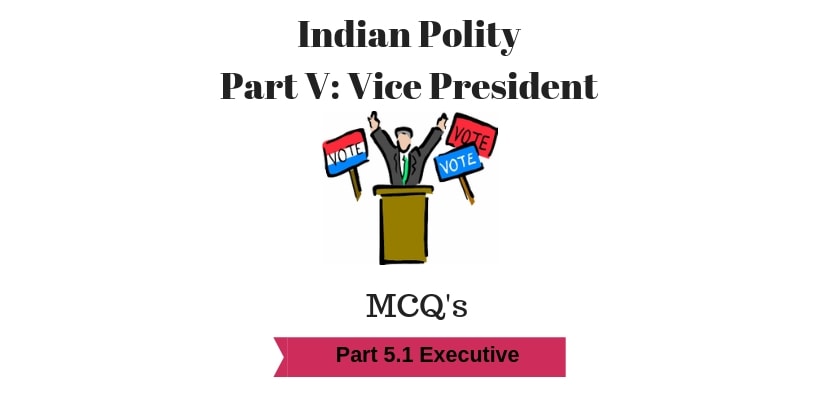Indian Polity Part V: Vice President Of India
The Vice-President Of India (Articles 63-73)
Part V of the Constitution of India under Chapter I (Executive) also discusses about the office of the Vice-President of India. The Vice-President of India is the second highest constitutional office in the country. He serves for a five-year term but can continue to be in office, irrespective of the expiry of the term, until the successor assumes office.
The Vice-President of India is also ex officio Chairperson of the Rajya Sabha. When a bill is introduced in Rajya Sabha, vice-president decides whether it is a financial bill or not. If he is of the opinion, a bill introduced in the Rajya Sabha is a money bill, he would refer the case to the Speaker of the Lok Sabha for deciding it.
1. Article 63: There Will be Vice-President of India
2. Article 64: Vice-President to be ex-officio chairman of the council of state
3. Article 65: Vice-President is acting like a President or to discharge his function during casual vacancies in the office or death, resignation or removal
4. Article 66: Election of Vice-President
5. Article 67: Term of office of Vice-President
6. Article 68: Time to organize the election to fill in Vice-President’s office and the tenure of the office of the person who completes the Casual vacancies.
7. Article 69: Oath or affirmation by the vice-president
8. Article 70: Discharge of president’s functions other contingencies.
9. Article 71: Content related to the election of a President or vice-president
10. Article 72: To Grant pardons power to vice-president
Removal of Vice-President of India:
A vice-president can be removed from his office by a proposal of the State Council passed by the majority of all the members of the Council and agreed by the House of the People; But no resolution will be taken for the purpose of this section unless the notice of at least fourteen days is given with intent to transfer the resolution.
Part V: Vice President Of India
1. Which article of the Indian Constitution says that India shall be a Vice-President?
A. Article 52
B. Article 61
C. Article 62
D. Article 63
[toggle] Answer – D
Explanation: Article 63 of the Indian constitution envisages that there shall be a Vice-President of India.[/toggle]
2. Which of the following statements is false?
A. The current salary of Vice President is 1.25 lakh per month
B. While acting as a caretaker President, the Vice President does not act as the Chairman of the Rajya Sabha.
C. Vice President may be re-elected on his post
D. The post of Vice President of India has been taken from the Constitution of France
[toggle] Answer – D [/toggle]
3. Which of the following Vice President was elected unopposed?
A. S. Radhakrishnan
B. R. Venkataraman
C. V. V. Giri
D. None of the above
[toggle] Answer – A
Explanation: S. Radhakrishnan, Hidayatullah, Shankar Dayal Sharma were elected unopposed.[/toggle]
4. Who among the following can contest the election of Vice President while remaining in office?
A. President
B. Vice President
C. Governor of the State
D. All
[toggle] Answer – D
Explanation: The President, Vice President, the Governor of the State and the Union or the Minister of State are not considered for the post of profit, so all the Vice-Presidential candidates can contest the election.[/toggle]
5. How can the Vice-President be removed from the post?
A. By the full process of impeachment
B. The Rajya Sabha can remove him by passing the resolution with the absolute majority but the consent of the Lok Sabha is necessary.
C. Both by a and b
D. None of the following
[toggle] Answer – B
Explanation: To remove the Vice President from the post, the resolution can be passed by the Rajya Sabha by the full majority, but the consent of the Lok Sabha is necessary. A 14-day notice should also be given to the Vice President.[/toggle]
6. Which of the following statements is false?
A. The Vice-President’s powers are similar to the Speaker of the Rajya Sabha as Speaker of the House.
B. Vice President can act as a caretaker President for a maximum of one year.
C. Vice President gives his resignation letter to the President
D. None of the above statements are false.
[toggle] Answer – B
Explanation: Vice President can work as an acting President for a maximum period of 6 months.[/toggle]
7. What conditions should be met for a candidate to become Vice President?
A. Candidate should not hold the office of profit
B. Candidate should not be a member of any House of Parliament
C. The candidate may be a member of State Legislature
D. Only a and b
[toggle] Answer – D
Explanation: A candidate for the post of Vice President should not hold any office of profit, should also not be a Member of Parliament and State Legislature.[/toggle]
8. Who investigates all the disputes related to the Vice Presidential election?
A. Parliament
B. Supreme Court
C. Election Commission
D. Both B and C
[toggle] Answer – B
Explanation: All the controversies and doubts related to the election of the Vice President are examined and the Supreme Court decides whose final decision is final.[/toggle]
9. Who among the following has never been Vice-President of India?
A. Jaswant Singh
B. Shankar Dayal Sharma
C. Zakir Hussain
D. B.D. Jatti
[toggle] Answer – A
Explanation: Jaswant Singh had fought against Hamid Ansari in Vice Presidential election in 2012, but defeated.[/toggle]
10. The Vice-President’s letter of resignation is to be addressed to the:
A. Deputy Chairman of Rajya Sabha
B. Chief Justice of India
C. President
D. Speaker
[toggle] Answer – C [/toggle]

